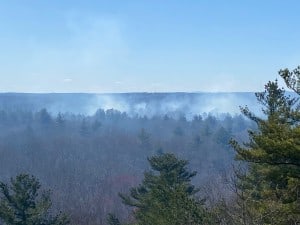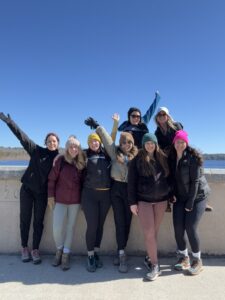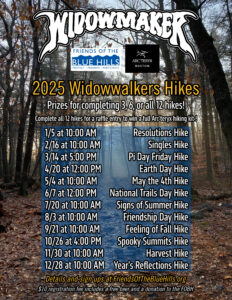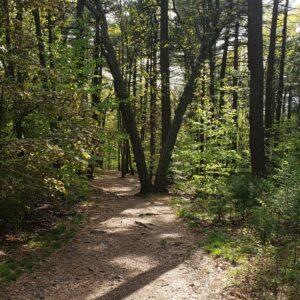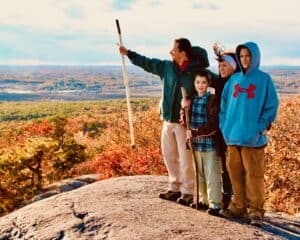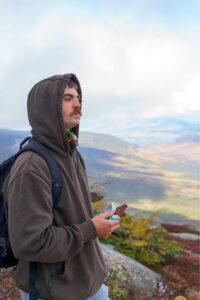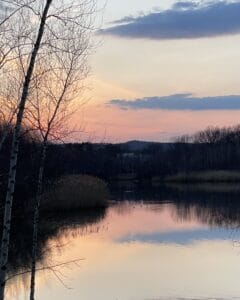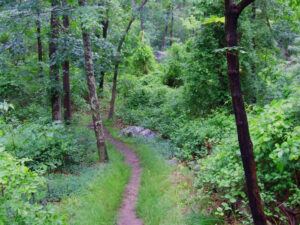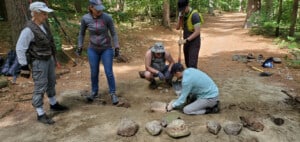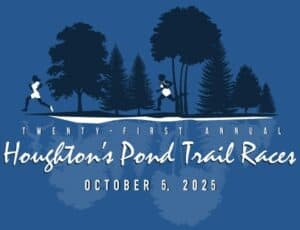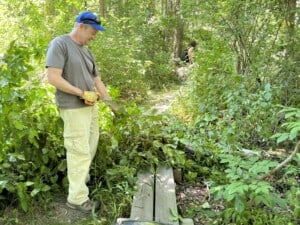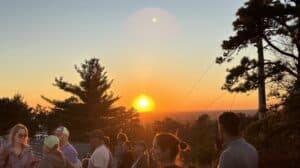A post from John B. Sheehan:
“Don’t it always seem to go, that you don’t know what you’ve got till it’s gone”
Joni Mitchell – Big Yellow Taxi
Since it was established in 1893, the 7000 acre Blue Hills Reservation in Quincy, Milton, Canton, Braintree, Randolph and Dedham has been an Edenic magnet for outdoors lovers—and a juicy target for developers. For the past thirty years, the Friends of the Blue Hills (FBH) has engaged in a perpetual struggle to keep development pressures at bay, fighting governmental and private initiatives that would expose the Reservation to a death by a thousand cuts.
The latest skirmish is a scheme by the Lantana function house in Randolph to pave part of this paradise and put up a parking lot. The preposterous pretext for this proposed land-grab is the safety of Lantana’s patrons, some of whom are allegedly forced to confront the mortal danger of crossing a side street from Lantana’s current parking lot. Lantana argues that the only solution to this Gordian problem is constructing a 378 space parking lot in heavily forested public lands, in the process destroying a decades-old trail and hemming in a rich vernal pool. The issue is currently before Environmental Secretary Ian Bowles, who is reviewing Lantana’s Draft Environmental Impact Report (DEIR) prior to deciding whether the transfer should occur. (Links to this and other relevant documents can be found at http://www.friendsofthebluehills.org/lantana.htm .) The public has until Friday, June 20, 2008 to submit responses to the DEIR to Secretary Bowles, and the protests should be loud and sustained.
Objections to this boondoggle encompass the legal, moral, political and practical. First and foremost, public parks should NEVER be sold off to private business interests except under the most dire of circumstances, something akin to a national emergency. This concept is enshrined in Article 97 of the State Constitution, enacted in 1972 to prevent this very thing from happening. The purpose of Article 97 is to “protect, preserve and enhance” all public parklands. Only if certain rigorous conditions are met (not present here) will a land transfer occur. In fact, Article 97 was first used in the 1970’s to permanently halt the construction of the Southwest Expressway, which would have obliterated the Fowl Meadow and Little Blue section of the Reservation.
The moral and political imperatives are simple: We are the stewards of this planet for future generations. ‘Unforgiveable’ should be the verdict handed down by our grandchildren if we permit irreplaceable forestland to be sold for transitory, private pecuniary interests.
The practical objections are addressed in detail in the FBH’s response to Lantana’s DEIR and can be summarized. Lantana seems to believe that swapping a few parcels of undevelopable land and throwing in some heavy equipment is enough to ‘buy’ a public park at a below-market price. (The valuation Lantana uses is not the highest and best criteria for commercial property, which this would be.) Alternative solutions for the ‘dangerous’ street crossing (bridge, crossing guard, speed bumps, etc.) were rejected as too costly or impractical. Instead, consistent with recent Massachusetts public works projects (see ‘Big Dig’), Lantana has opted for the most complex and expensive (to the public) option. And lastly is the unstated fact that Lantana’s current parking lot parcel would suddenly become buildable—thanks to the new parking lot in the Blue Hills Reservation. Which, it can be surmised, would eventually require expansion to accommodate the new development.
All this because Lantana claims that it fears for its customers’ safety. (If it truly is as dangerous as Lantana says, the town of Randolph might want to consider shutting down Lantana itself as a public nuisance.) I don’t know about you, but I taught my kids to look both ways before they cross the street. Maybe Lantana could tell its patrons the same thing.

